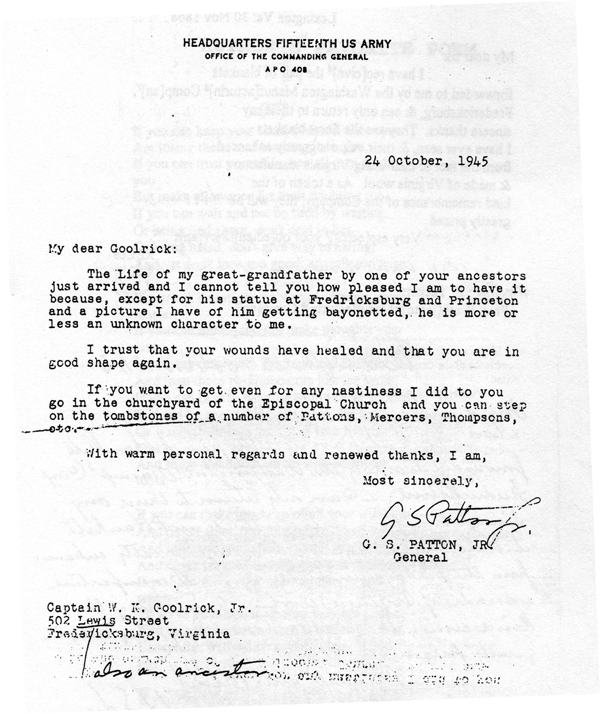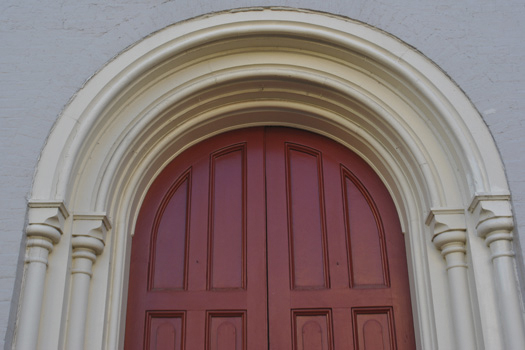From A Life in ‘The ‘Burg – John C. Goolrick
Introduction -The letter below which indicates that General Patton knew about St. George’s Cemetery is included in the appendix of John Goolrick’s book on Fredericksburg. Goolrick (1935-2005) was a columnist and reporter for the Free Lance-Star. A column at his death wrote “John Goolrick liked the New York Yankees, Winston Churchill and George Patton (to whom he was related), dogs, horses that could run, travel, most legal beverages, schmoozing, and, of course, politics and, not of course, people. ” Goolrick also provided a transcript of the letter and information about the Patton family. Anthony Patton, buried in St. George’s Cemetery, is a cousin of George Patton and with his wife Virginia were one of the last burials.

My dear Goolrick
The life of my great-grandfather by one of your ancestors just arrived and i cannot tell. you how pleased i am to have it because, except for the statue at fredericksburg and princeton and a picture i have of him getting bayoneted, he is more or less an unknown character to me.
I trust that your wounds have healed and that you are in good shape again. If you want to get even for any nastiness I did to you go in the churchyard of the episcopal church and you can stomp on the tombstones of a number of Pattons, Mercers, Thompsons, etc.
G.S. Patton Jr. General U.S. Army
“The letter was sent to Capt. Kinloch Goolrick, my second cousin, who then lived on Lewis Street in Fredericksburg. He is a retired editor of time-life books who now lives in New York city. The letter was dated October 24, 1945, less than two months before the famed General George S. Patton Jr. suffered a fatal injury in a traffic accident in Germany. The first army mp to arrive on the scene was young Peter Babalas of Norfolk, Virginia who later became a Virginia State Senator, he told me the accident occurred at low impact and the general’s fatal injury was a one in a thousand shot.
“Kinloch had been on Pattons’s staff in Morocco, Algeria, Sicily, England and France and then was severely wounded in the Battle of the Bulge. He recalls waking up in the hospital and seeing the general standing at his side.
“The book he sent Patton was, ‘The Life of General Hugh Mercer” written by my grandfather, John T. Goolrick Sr. and published in 1906. Mercer, who was killed in action during the battle of Princeton during the Revolutionary War, was not Patton’s great-grandfather but his great-great-great grandfather.
“In a chapter called, ‘the Confederate Pattons,’ from a book Fredericksburg historian Bob Krick is writing he notes that the first George S. Patton, the grandfather of the World War II general, died at the head of his brigade at Winchester on September 19, 1864 in the first major battle of the 1864 Shenandoah Valley Campaign. A number of Patton brothers fought with the army of Northern Virginia.
“Although born in California, General Patton’s roots were in Fredericksburg. Robert Patton, his great-great grandfather, came from Scotland to America around 1770. He settled in Fredericksburg, joined St. George’s Episcopal Church, became a prominent merchant and finally married Anne Gordon Mercer, Hugh Mercer’s daughter although by then mercer had been killed, many of Patton’s ancestors were members of St. George’s Episcopal and Fredericksburg Presbyterian Church.
“With her husband dead and her state devastated, Patton’s grandmother, Susan Patton, accepted an invitation from a brother to move to California. The famous future General was born there in 1885 into an affluent family since his father was an attorney. Patton grew up hearing stories about his confederate ancestors and knowing he wanted to be a soldier. Among those who often visited the Patton home and told war stories was the famous confederate ‘Gray Ghost’ Col. John Singleton Mosby who regaled young Patton for hours with tales of his civil war adventures.
“Patton returned to Virginia when he enrolled in Virginia military institute, but next year, 1904, got an appointment to west point. he saw combat action both in 1916 in mexico and in France in World War I.
“Since the general, who loved cavalry, was stationed a number of times at Fort Myer, there is little doubt he visited the Fredericksburg region often where he saw the Washington avenue statue of his ancestor and studied civil war battlefields. after i sent a copy of the Krick chapter to Joanne Holbrook Patton of Massachusetts, daughter-in-law of the general, she wrote back in gratitude that, “even our son, bob, who wrote the family up in his book ‘the Pattons’, said he was reading about some of the Patton brothers in mr. krick’s manuscript for the first time.” Bob Krick coached Robert Duvall on the mannerisms of General Robert E. Lee for Duvall’s role as lee in ‘Gods and Generals.’
“Krick, knowing that Patton is one of my heroes, occasionally brings me brochures advertising authentic signed letters and photos from the general at prices far beyond my pocketbook. when i sent Mrs. Patton one of the brochures, she wrote, ‘we are always amused—— and sometimes shocked — by the outrageous prices people charge or pay for ‘celebrity memorabilia,’ such as the signed Patton parade photo. Imagine-$5,000”
“Sadly, Patton’s son, George Smith Patton who also followed in his father’s footsteps and became a General, with a distinguished record, is now, according his wife, no longer able to read or correspond. he is a person who had always been proud of his heritage and, though I never met him, had the pleasure of conversing by phone with him several times.
“When I was a child in World War II days and began to adopt General Patton as a hero, i had no idea of his Fredericksburg connections since my grandfather wrote his mercer biography in 1906 when young George Patton was just 21 . I haven’t been to the Hugh Mercer Apothecary Shop in recent years but hope they tell visitors about the Patton connection. He was the greatest combat general of the 20th century and I think Mercer, his distinguished ancestor, would have been proud of him. I bought a bust of Patton from a downtown store and proudly display it in my office. Though he was called ‘Old blood and Guts’ i think most of those who served under him were proud of the honor, including Bill Stern who for years operated a country store in Stafford.
